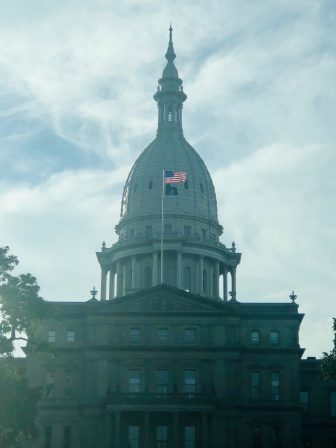After years of lobbying for a referendum, Proposal 1 to legalize marijuana will appear on the ballot Nov. 6
After years of lobbying and legal battles, voters will have a say on allowing Michigan residents 21 years and older to possess, sell, grow or use marijuana.
Organizations across the state have taken a stance on ballot Proposal 1, which will have a powerful impact on laws, economics and public health. Groups including Smart Approaches to Marijuana Action, Marijuana Policy and Project Foundation and MI Legalize have weighed in on the pros and cons of the proposal.
Nick Zettell, co-founder and CEO for MI Legalize, has been working on this campaign since 2015, when the group was unsuccessful in placing the legalization of marijuana on the ballot. He said the group’s success this year was the result of building a broader coalition of supporters.
Groups lobbying against the proposal urge voters to vote no due to a feared increase in child usage rate, health implications and traffic incidents and deaths. Groups supporting the proposal, including MI Legalize, advocate for its benefits to the economy and potential to decrease crime rates in Michigan.

Katie Kalass
The Michigan general election will feature three ballot proposals that will be voted upon on November 6. Widespread controversy continues to surround proposal one which, if approved, will allow Michigan residents 21 years and older to possess, sell, grow or use marijuana products.
For Zettell, this issue is also important to advocate against racism, because he said minorities are disproportionately charged with marijuana usage and possession. He said mass incarceration has a become a huge problem, and the war on drugs has been a failure.
“I believe there’s a huge racial disparity on the arrests,” Zettell said. “A lot of the social justice components resonate with me, and those are the things we are fighting for.”
According to the New York Times, African Americans and caucasian citizens use marijuana at comparable rates, but African Americans are more likely to be arrested for marijuana charges in every state except Hawaii. In Michigan, African Americans are 3.3 times more likely to be arrested for these charges, the article says.
Howard Wooldridge, co-founder of LEAP (Law Enforcement Against Prohibition) and founder and drug policy expert for Citizens Opposing Prohibition.org, also advocates for Proposal 1 to decrease marijuana arrests and ensure that police officers are able to focus on protecting citizens.
Wooldridge previously worked as a police officer in Mid-Michigan for 18 years, retiring as a detective from Bath Township after working in three area Lansing departments as an officer, including Bath township, Dewitt township and the city of Potterville. Wooldridge said his main goal is to protect people, and he believes approval of this proposal will support the efforts of many officers.

Courtesy of Howard Wooldridge
Howard Wooldridge Was a police officer in Mid-Michigan for 18 years, retiring as a detective from Bath Township. He now uses his voice and perspective as a detective and officer to advocate for the legalization of marijuana.
“The main goal is to protect our young people better, by not wasting time on a green plant that is used in the privacy of an adult home,” Wooldridge said. “Good news is, that it shows clearly in Washington State and Colorado that after four years of legalization – detectives are doing a significantly better job arresting violent felons, pedophiles, etc. as they stop wasting time looking for a green plant.”
On the other hand, legalizing marijuana has been opposed by many major public health organizations, including the American Medical Association, the American Society of Addiction Medicine and the American Academy of Pediatrics due to its potentially harmful health effects.
A major group opposing marijuana legalization is Smart Approaches to Marijuana (SAM), a bipartisan group of professionals working in mental health and public health who believe policy should be based on principles of public health and safety and reputable science.
SAM provides detailed information on major health organizations that oppose legalization, including the American Cancer Society, which “does not advocate the use of inhaled marijuana or the legalization of marijuana.”
For college students, the legalization of marijuana imposes many changes to campus culture. For Michigan State University public policy senior Kyle Killeen, the proposal offers many pros and cons.

Katie Kalass
“The state makes money it can spend on things like schools and roads, while we as a society can stop sending people to prison for marijuana possession,” said Michigan State University public policy senior Kyle Killeen.
Legalizing and taxing marijuana will provide the state with money to spend on things like schools and roads, while saving money on sending people to prison for possession charges, Killeen said.
Although Killeen supports Proposal 1, he also recognizes that legalizing marijuana may put the state at risk for other issues.
“We don’t know what legalization would mean for the child usage rate and overall drug use rate,” Killeen said. “The decriminalization and legalization of anything that can get you high will always be a gray area for a government. Is it a government’s responsibility to keep their citizens away from things that could harm them or should they just stay out of their right to individual choice?”
The last day to register to vote is Oct. 9. Proposal 1 will appear on the ballot on Nov. 6 for the Michigan general election, and Michigan voters will decide the fate of the legalization of marijuana.
Proposal 18-1
A proposed initiated law to authorize and legalize possession, use and cultivation of marijuana products by individuals who are at least 21 years of age and older, and commercial sales of marijuana through state-licensed retailers
This proposal would
- Allow individuals 21 and older to purchase, possess and use marijuana and marijuana-infused edibles, and grow up to 12 marijuana plants for personal consumption.
- Impose a 10-ounce limit for marijuana kept at residences and require amounts over 2.5 ounces be secured in locked containers.
- Create a state licensing system for marijuana businesses and allow municipalities to ban or restrict them.
- Permit retail sales of marijuana and edibles subject to a 10% tax, dedicated to implementation costs, clinical trials, schools, roads, and municipalities where marijuana businesses are located.
- Change several current violations from crimes to civil infractions.